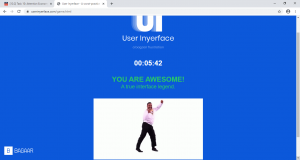Linking Assignment 5 – Task 10: User Inyerface
I chuckled as I read Katlyn’s post from the User Inyerface game. Although I was connecting with the game in a different way, I can relate to the challenges she faced completing the game. The words “I know what you mean and I felt the same way” floated in my mind as I was reading her post.
Katlyn Paslawski’s Blog: https://blogs.ubc.ca/paslawski540/2020/07/09/attention-economy/
My Blog: https://blogs.ubc.ca/melomart/2020/07/12/task-10-attention-economy/

User Inyerfeace Online Game by Bagaar: https://userinyerface.com
Katlyn and I are using WordPress so it was easy for me to navigate her website. She has tabs at the top part with headings for introduction, tasks, linking assignment, and final project. It was easy to go into the task tab to access the attention economy post. I also like the background picture of mountains as her back drop.
I connected with Katlyn’s struggle as she faced each of the challenges in order to reach the end of the game. The short video clips embedded in her post was such a clever way of communicating her frustration and happiness! Like her, in the beginning, I thought that this would be a simple task compared to the other tasks that we had to do in the past. I also changed computers because I thought I would be faster using a mouse than a track pad.
I enjoyed the way Katlyn led the reader through each of the activity in a humorous way. She showed a visual of each of the activity and talked about her thoughts and the process such as when she was figuring out what she was supposed to do when completing the email and password part. I also googled the meaning of Cyrillic ????
Another thoughtful paragraph in Katlyn’s post was when she was completing activity two where she had to choose three interests and upload a picture. She mentioned that the flashing numbers at each level and the highlighted green “cancel” button at the bottom of the screen was distracting. It was a subtle way of mentioning to the reader that this was a dark pattern at work.
I related to her challenges at activity three because at this stage, I didn’t care about real answers anymore and just filled in the boxes with personal information of what I thought the game wanted. Like Katlyn, I also struggled completing the birthday and age section because this part had to actually match up. It was the little details that added to the frustration.
It took me longer to complete the game because I tend to read everything, including the small print, especially when it looked like a form that wanted personal information. Katlyn summed up the experience when she said that the “game goes against what you think you know” and therefore de-stables the predictability that we are use to when filling out forms. As a consumer, one often gets use to filling out online forms that skipping the fine print and when the order of the meaning changes, we don’t often see it.
On another note, I was playing this game when I visited my elderly mom. Now, she never pays any bill and never shops online. For fun, okay, as an experiment, I asked if she wanted to play the game. I said that she can press any button, it’s safe and she won’t be giving any personal information away. She never got past the first activity. She became frustrated with the pop-up cookie button, the timer, buttons that didn’t work, and misleading directions. Technology isn’t new, but it is continually becoming more prevalent in our lives. Right now, it seems to be like the wild west because there are no regulations and everything is grey. Brignull mentioned that consumer knowledge is helpful as well as a specific code of eithics with transparency (Zeynep Tufekci), and new models of accountability (Tristan Harris). I think these are great goals to strive for moving forward with technology. I can understand that it would be challenging to create specific rules for companies to follow and to protect consumers from dark web patterns when technology changes so fast that things become obsolete or outdated. There are lessons in school for elementary students around internet safety and internet bullying. I think it would be great to expand this to workshops offered in libraries for older adults around online consumer safety and knowledge.